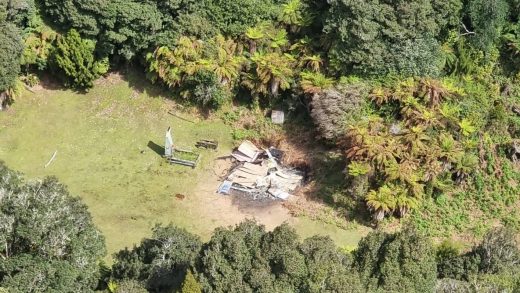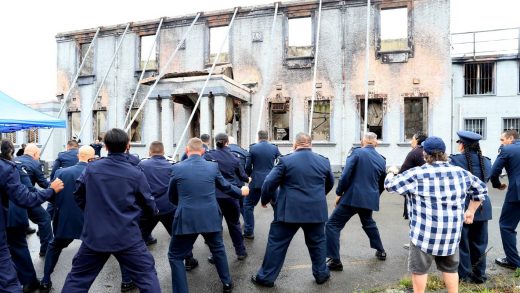
A favourite pastime of mine growing up was flipping through photo albums of my parent’s overseas experience together.
They flew to England in their early 20s, pulled pints in a London pub, then, in a Ford Escort van, they spent all their savings as they travelled around Europe.
Stored securely in the car seat pockets were paper maps, music tapes, well-thumbed books and a film camera.
Phone calls home happened once a month in dodgy phone booths covered in graffiti drawings of human anatomy and scratched numbers for people who would “give you a good time.”
READ MORE:
* ‘A fantastic time to be in the UK’: Kiwis in demand in London
* Coronavirus: Is this the end of the traditional Kiwi OE?
* The story behind the giant shark crashing into a UK roof
* A helping hand for Kiwis on their big OE
Neil Mythen
Patricia Mythen by the English seaside.
Handwritten postcards were sent away weekly.
My Dad, Neil Mythen, filled a journal with stories of their travels. Reading it made me feel so nostalgic for the way they travelled. So completely in the moment, without technology’s distraction.
He told me taking film photos was great because you really had no idea what the photos would turn out like until you got them developed, usually well after the travelling was done.
“Usually you forgot where you took them in the first place … so it was like reliving the travelling experience all over again,” he said.
Navigating via map was a “real test” of partnership and it’s probably why they’re still married today.
Samantha Mythen
Samantha Mythen loaded up as a backpacker in Geneva Airport.
It felt right to explore the world before coming back to NZ and settling into a career and “putting down roots,” he said.
When my parents travelled, the concept of foreigners in a stranger country was still a novelty to many people.
“There were still a lot of people who didn’t really know where NZ was and what the country was like. Back then the only information was from books, magazines and maybe the occasional TV,” he said.
They travelled with a Silver Fern sticker on the back of their van.
Neil Mythen
A Turkish campsite in the middle of nowhere.
One day, lost in Turkey and running low on gas, they stopped in a small town to see if they could get directions.
“As soon as I hopped out the Van, a booming voice from a balcony directly above us shouted out Kiwi Kiwi. He spotted the sticker on the back of the Van. In no time at all we were given tea, food, directions, basically the works,” he said.
A favourite memory of my Dad’s was stopping to have lunch in a Taverna at the bottom of the Peloponnese Peninsular in Greece.
They sat outside on rickety chairs under an old veranda covered in ancient grape vines.
Samantha Mythen
Samantha Mythen in Vercoin, Switzerland.
The owners spoke no English and the menu was in Greek so they pointed at the dishes, nodded heads and hoped for the best.
“Suffice to say it was delicious, a variety of grilled fish, salad, olives, hummus. The beer was cool and the owners even played a few tunes on old guitar … a magical night.”
At the end of March, this year, I set off on my own OE.
And I’ve realised just how much this traditional Kiwi rite of passage has changed.
It’s no longer about working minimum-wage jobs like pulling pints in a pub. These days, Kiwis will travel for a month, then settle in London with a serious, salaried job.
Neil Mythen
Patricia and Neil Mythen at the Pathenon.
Long weekends are opportunities for exploring Europe further.
Taylor Tunstall, at age 25, set off on his OE in April this year.
“I knew there was more to explore in the world than the 20km radius around my flat in Auckland and the odd holiday to Queenstown,” he said.
“London seemed like the centre of the world with so much happening, so much history, and of course, on Europe’s doorstep.”
Tunstall has basked in steady sunshine while spending a week sailing around Croatia on the azure Adriatic Sea, he’s partied in Prague, aimlessly wandered around Amsterdam, and explored Budapest’s history-rich streets.
Taylor Tunstall
Visiting Stonehenge.
After a night out with friends at the only bar in the entire town of Peniche, Portugal, Tunstall and his friends ended up scraping on the side of a cobblestone road in the middle of nowhere at 3am, miles away from their accommodation.
Miscommunication with two Portuguese brothers giving them a lift home ended up with Tunstall being whacked across the head with a baton.
“We ended up running down the road to get away from them and just walked home. I think we got home at about 5am … fun times!” he said with a laugh.
His phone was stolen in Spain, taken with it his Kiwi and UK bank cards and his ID.
Find my iPhone states the phone is now in Morocco.
Taylor Tunstall
Sailing in the Mediterranean.
Compared to when his Dad travelled on his OE, Tunstall only had three days without a phone.
“Thankfully I managed to convince my friend, who I had only just met a week ago in a hostel, to buy me a new phone in Bordeaux,” he said.
Longer though? He thinks would be great.
“Travelling without the safety net of a phone would create a fun and challenging dynamic. You might miss some things but you’d truly have a unique experience of each of the places you visited,” he said.
Travelling is all about collecting those stories, the ones we’ll look back on when we’re old and have a chuckle about.
Tunstall said another attraction of heading overseas was the opportunity to earn more money and gain valuable career experience.
Taylor Tunstall
Taylor following in his father’s footsteps.
After all his travelling though, getting a full-time job was not very appealing and so he tossed up the idea of pub work.
“But after hearing they were only paying £9/hr and probably only getting 20hrs work a week, I decided to get back to my career. I’m now a construction project manager,” he said.
Tunstall was almost following in his dad, Phil’s footsteps.
“I think I was mid-air on a one-way flight to Europe when the ‘87 stock market crash happened,” Phil Tunstall said.
“I always said Europe because it sounded bigger and better than London, England. Think big building and expansions had come to an end in New Zealand, redundancies were the talk of the town and the radio in the milking shed kept playing the song with the lyrics ‘I gotta get outa this place if it’s the last thing I ever do’.”
Phil Tunstall
Heading off on an adventure.
Phil and his friend yelled along at the top of their voices.
At age 21, they paid $2000 each to book their flights.
“We knew we had two-year visas for Britain but had no plans for return. Looking back I can see we were a bit Croc Dundee,” he said.
They started the Eurail from France, a trip of a lifetime Phil said.
“Mostly we used the train for a place to sleep overnight with the anticipation of a new city the next day. Last on the train at night and first off in the morning.”
They tagged onto the end of guided tours and visited too many cathedrals.
After two months and out of money, they headed back to London for the winter, working live-in pub jobs for £2 an hour.
Phil Tunstall
Making money to go travel.
When summer shone along, the two friends teamed up with a new friend originally from Northland and converted a Land Rover Safari into a camper.
“We pulled out the side-by-side seats and installed a fridge for the beers and cheese. Me sleeping on the floor inside and the roof rack got a sheet of ply and a two-pole tent which we set up each night for Grant and another tent on the ground for Haydon,” he said.
They shaved their heads for a dare and then drove through France, Spain and Portugal.
“The French found the Land Rover a little smoky when driving along the Champs Élysées and became especially excited when we drove around a roundabout the opposite way to them. We laughed and they cried,” he said.
“The Spanish said ‘go away Brit’ after seven long days and nights at the Running of the Bulls festival in Pamplona, and the Portuguese were sleeping most of the day so didn’t notice us drinking all the Port in Porto.”
Phil Tunstall
The European accommodation set up.
They called their parents via a collect pay phone, but only if it was important.
They met many locals when asking for directions and even stayed with a few.
Running out of funds sent them back to England again.
They got harvesting jobs and learned a new way of life – that of the country English village, where one must fit in or be ousted.
They were back home in time for the summer of 1989.
“Cyclone Bola was still all the talk and my mates at Kamo FC thought I’d been away playing professional football but that it didn’t work out,” said Phil.
“In 1987, it was a once-in-a-lifetime trip you did to get out of your system, now it’s an every other year type trip … Hence, we are going at Christmas to see our two sons in London. Can’t wait.”
Clint Heine started up an online community called Kiwis in London, 11 years ago.
He’s helped many Kiwis on their OEs.
He set out on his own two-year youth mobility visa in 2003, at 26 years old.
“I had never been outside of New Zealand and never gave it too much thought until I was on the plane out,” he said.
“New Zealand was too small and I felt trapped.”
With no phone, Heine was thrown into the deep end when looking for rooms and job interviews in London. He just used the London A to Z.
His only plan was to travel until he ran out of money and then see what cash he could make in London to help fund further European adventures.
“I’ve been on TV more times than I thought I ever would in my life,” said Heine.
He starred in a TV commercial in India, partied with Latvian celebrities at the blonde festival as an invited guest of Mrs Universe and he made friends with famous Bangkok Michelin Star chef Jay Fai.
“The OE is still going 19 years later. I’m always travelling and going to different countries,” he said.
Heine said the most challenging thing about travelling is seeing others NOT taking advantage of the gift of travel.
Clint Heine
A great discovery while travelling.
“I think a few people forget their manners on holiday or choose to travel to places where they fail to immerse themselves in the culture,” he said.
“I see so many groups of people who think one day on a bus tour per city is travel. Or people who never engage with the locals. Watching travellers who go to destinations just to party and leave really kept me on the periphery.”
When Heine reflects on his earlier travels without a phone, he said travelling was better without it.
“When I first left NZ it was thick Lonely Planet books only and nothing else,” he said
“I learned to navigate Saigon quickly on my first few days there with no maps at all. It was great for when I was meeting locals for drinks and finding my way back!
“Now I have everything in my hand which has made me lazy. Plus now I take way more photos than I planned too.”
Clint Heine
Clint Heine with Mrs Universe.
Heine has noticed changes to the traditional OE.
“Younger people are coming over with more money and more expectations of a better job,” he said.
“The days of pulling pints and a three-month European van trip are almost over.”
People seem to be seeking nicer apartments compared to the “big antipodean flat shares” of the past. They’re doing weekend trips to Europe for a couple of nights so they can be back for work on Monday.
“Flashpacking is more common than budget backpacking.”
I like to think, with my OE, I’ve tried to get back to the roots of what an OE should be about. Collecting stories to look back on and laugh about.
I’ve worked in a tiny hotel in the middle of nowhere in Cornwall. Done party shifts at a hostel in Barcelona. Chased three boys around a park for hours as an au pair. I’ve spent the past month sleeping on different couches.
Next, I’m off to Japan to work as a ski instructor.
I’m really tempted to try my hand at turning my phone off. Getting lost. Seeing what stories I’ll end up writing.
Phil’s advice: “Just book the ticket if you really want something to happen.”


